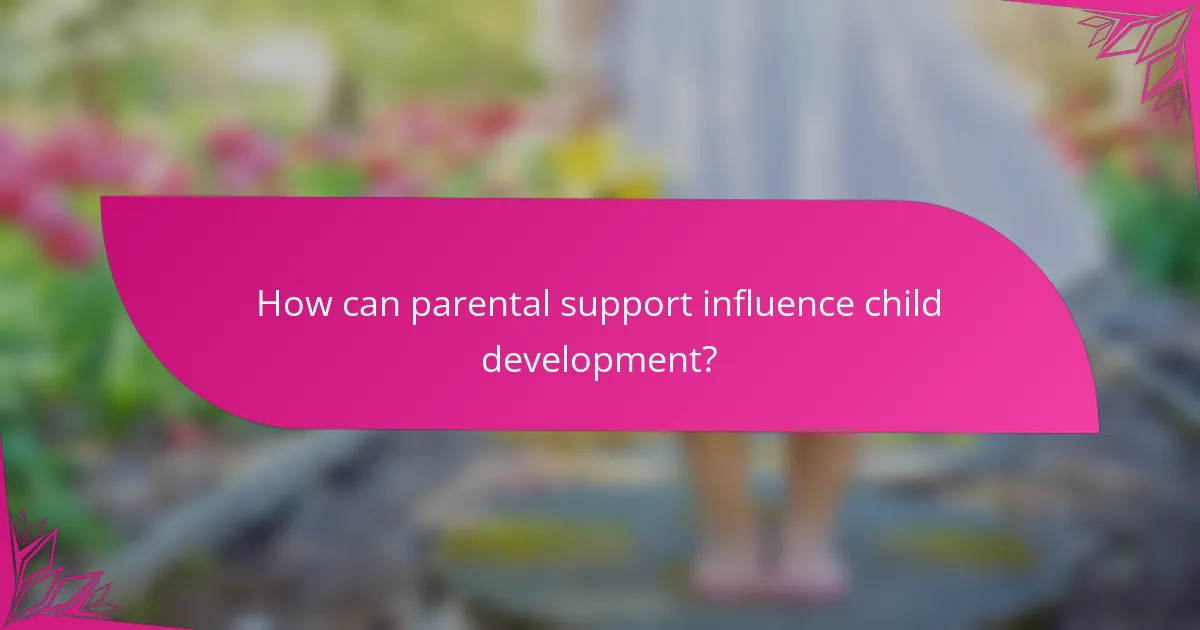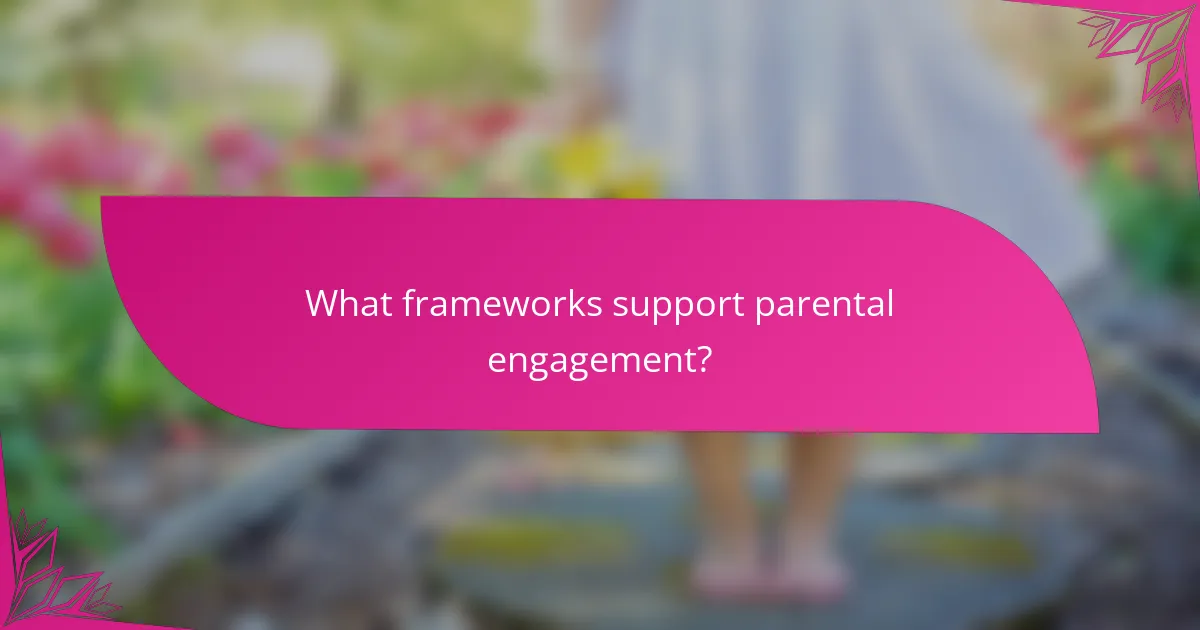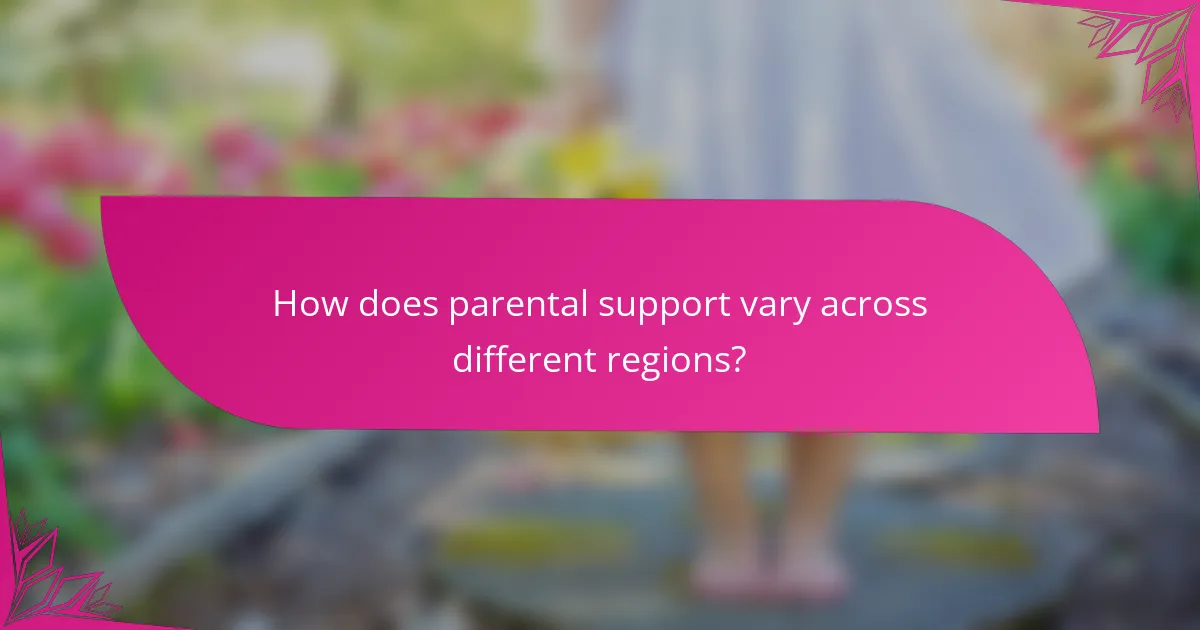Parental support is essential for children’s emotional, cognitive, and social development, creating a nurturing environment that encourages resilience and learning. When parents actively engage in their children’s education, it not only enhances student success but also strengthens family relationships and community connections. By fostering open communication and utilizing technology, parents can stay informed and involved, reaping significant benefits for both themselves and their children.

How can parental support influence child development?
Parental support plays a crucial role in shaping various aspects of child development, including emotional, cognitive, and social growth. Engaged parents can foster a nurturing environment that promotes resilience, learning, and interpersonal skills.
Emotional well-being
Parental support significantly impacts a child’s emotional well-being by providing a secure attachment and a sense of belonging. Children who feel supported are more likely to develop self-esteem and cope effectively with stress and challenges.
To enhance emotional well-being, parents should practice active listening and validate their child’s feelings. Simple actions like spending quality time together and encouraging open communication can strengthen emotional bonds.
Cognitive growth
Supportive parenting is linked to cognitive growth, as it encourages curiosity and a love for learning. Engaged parents often provide stimulating activities and educational resources that promote critical thinking and problem-solving skills.
To foster cognitive development, parents can read with their children, engage in educational games, and ask open-ended questions that stimulate discussion. Regularly exposing children to new experiences can also enhance their cognitive abilities.
Social skills enhancement
Parental involvement is essential for enhancing a child’s social skills, as it teaches them how to interact with others and navigate social situations. Children learn important lessons about empathy, cooperation, and conflict resolution through their parents’ guidance.
To improve social skills, parents should encourage playdates and group activities, allowing children to practice social interactions. Modeling positive behavior and discussing social scenarios can also help children develop effective communication skills.

What are effective ways to engage parents in education?
Effective engagement of parents in education can significantly enhance student success. Strategies include fostering open communication, providing opportunities for involvement, and utilizing technology to keep parents informed and connected.
Parent-teacher conferences
Parent-teacher conferences are vital for building relationships between educators and families. These meetings allow parents to discuss their child’s progress, address concerns, and collaborate on strategies for improvement.
To maximize effectiveness, schools should schedule conferences at convenient times and encourage parents to prepare questions in advance. Offering virtual options can also increase attendance, accommodating parents’ busy schedules.
Workshops and seminars
Workshops and seminars provide parents with valuable insights into educational practices and child development. Topics can range from academic support strategies to social-emotional learning, equipping parents with tools to assist their children.
Schools can host these events in person or online, ensuring accessibility for all families. Providing resources, such as handouts or follow-up materials, can enhance the learning experience and encourage ongoing engagement.
Online engagement platforms
Online engagement platforms facilitate communication and collaboration between schools and parents. These platforms can include portals for tracking academic progress, sharing resources, and providing updates on school events.
To ensure effectiveness, schools should choose user-friendly platforms and offer training sessions for parents. Regular updates and interactive features, such as forums or messaging, can foster a sense of community and keep parents actively involved in their child’s education.

What benefits do parents gain from involvement?
Parents gain numerous benefits from their involvement in their children’s education, including improved relationships, greater access to resources, and stronger community ties. Engaging actively can lead to a more supportive environment for both parents and children.
Stronger relationships with children
Involvement in a child’s education fosters stronger emotional bonds. When parents participate in school activities or help with homework, they demonstrate care and commitment, which can enhance trust and communication.
To strengthen these relationships, parents can set aside regular time for discussions about school, attend parent-teacher meetings, or volunteer for school events. Simple actions like asking about a child’s day can make a significant difference.
Increased knowledge of educational resources
Active parental involvement equips parents with valuable insights into educational resources available for their children. This includes understanding school programs, tutoring options, and extracurricular activities that can support learning.
Parents can benefit from researching local educational resources, such as libraries, community centers, and online platforms. Staying informed about school policies and available support services can help parents make better decisions for their children’s education.
Enhanced community connections
Engaging in school activities allows parents to build connections within their community. These relationships can lead to a support network that benefits both parents and children, fostering a sense of belonging.
To enhance community ties, parents can participate in local events, join parent-teacher associations, or collaborate with other families on school projects. These connections can provide additional resources and support for educational endeavors.

What frameworks support parental engagement?
Frameworks that support parental engagement include structured guidelines and community models designed to foster collaboration between parents and educational institutions. These frameworks help create a supportive environment that enhances student success through active parental involvement.
National PTA guidelines
The National Parent Teacher Association (PTA) provides a set of guidelines that emphasize the importance of family engagement in education. These guidelines encourage schools to develop partnerships with families, offering strategies for effective communication and involvement.
Key components of the National PTA guidelines include establishing clear communication channels, organizing family events, and providing resources that empower parents to support their children’s learning. Schools are advised to create welcoming environments that invite parental participation.
Community engagement models
Community engagement models focus on collaboration between schools, families, and local organizations to enhance educational outcomes. These models often involve partnerships that leverage community resources to support student learning and well-being.
Examples of effective community engagement models include family resource centers and school-community partnerships that provide workshops and events tailored to parents’ needs. Schools should assess local resources and actively involve parents in decision-making processes to strengthen these partnerships.

How does parental support vary across different regions?
Parental support can differ significantly based on geographical and cultural contexts. Factors such as urbanization, cultural norms, and available resources shape how parents engage with their children across various regions.
Urban vs. rural engagement
In urban areas, parental support often includes access to a wider range of educational resources and extracurricular activities. Parents in cities may engage more frequently with schools and community programs, benefiting from diverse opportunities for their children.
Conversely, rural parents might face challenges such as limited access to resources and fewer organized activities. However, they often provide strong familial support and community ties, which can foster close-knit relationships and collaborative learning environments.
Cultural influences on involvement
Cultural beliefs significantly impact parental involvement in education. In some cultures, active participation in school activities is highly valued, leading to greater engagement from parents. This can manifest in volunteering, attending meetings, and supporting homework.
Other cultures may prioritize independence, resulting in less direct involvement in academic settings. Parents might focus on providing a stable home environment instead, emphasizing values such as self-reliance and personal responsibility over structured educational support.

What are the challenges to parental engagement?
Parental engagement faces several challenges that can hinder effective participation in a child’s education and development. Key obstacles include time constraints, lack of resources, and communication barriers, all of which can significantly impact the level of support parents can provide.
Time constraints
Time constraints are a major barrier to parental engagement, as many parents juggle work, household responsibilities, and personal commitments. This often leaves little time for involvement in school activities or educational support at home.
To navigate these challenges, parents can prioritize their schedules by setting aside specific times for school-related activities, such as attending meetings or helping with homework. Even short, focused interactions can make a difference.
Additionally, schools can support parents by offering flexible meeting times or virtual participation options, making it easier for parents to engage without sacrificing other responsibilities.
